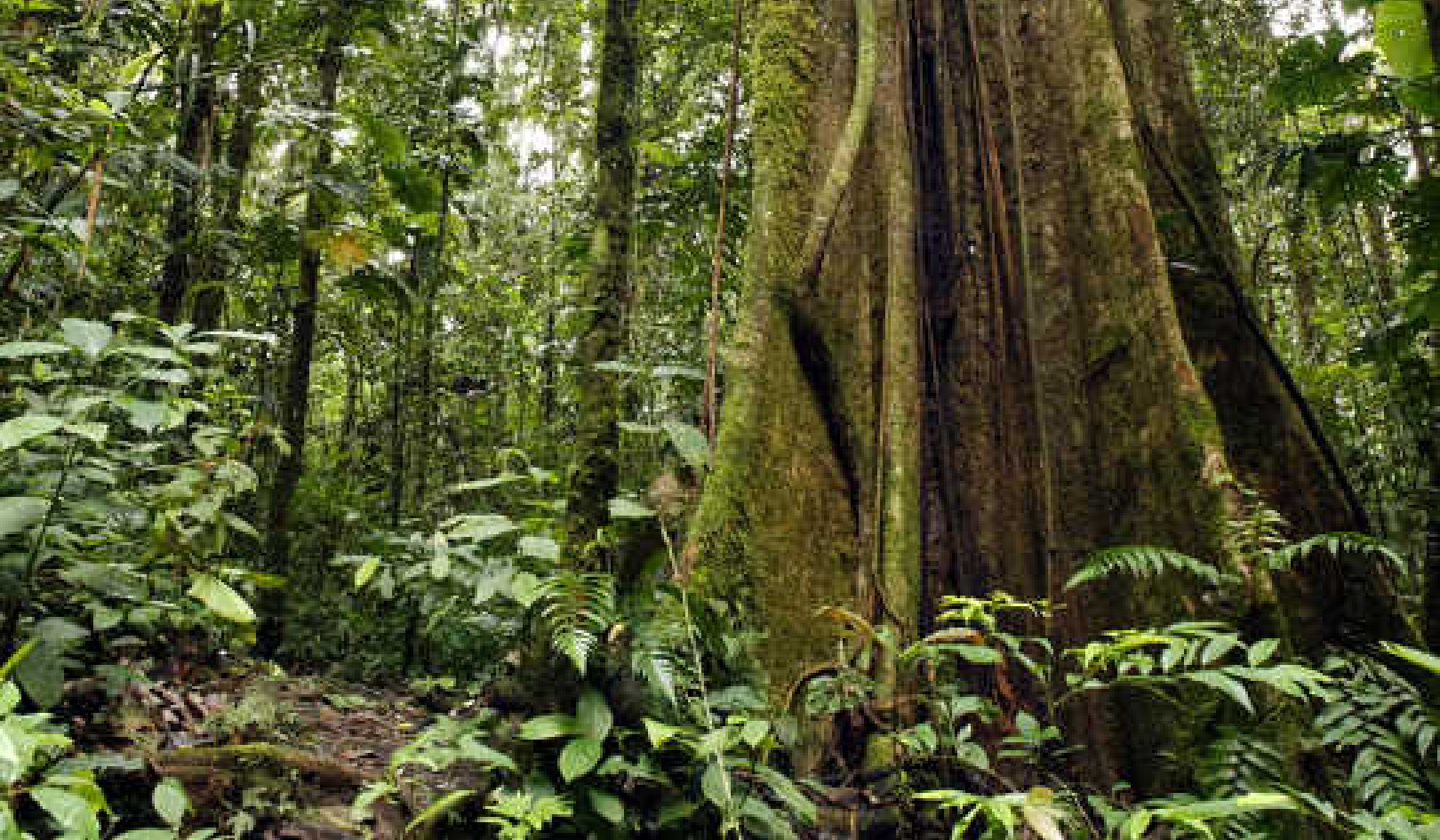
No one can doubt that we live in a time of unprecedented ecological destruction. The fabric of life on this planet is being degraded at an ever accelerating pace, accompanied by massive loss of animal and plant diversity and escalating threats to human health and well-being. Evolutionary biologists tell us that there have been numerous episodes of worldwide extinction before, including five major "spasms" involving the loss of up to 90 percent of existing species -- the last one being the cataclysm sixty-five million years ago that brought the Age of Dinosaurs to an end. What is unprecedented about the present situation is that it is the actions and technological productions of one species -- the human being -- that are bringing about this biosphere meltdown. Increasing numbers of people have therefore come to the conclusion that it is in the hearts and minds of human beings that the causes and cures of the ecocatastrophe are to be found.
This is the basic reason why a psychologist like me is concerning himself with the imbalance in the human-nature relationship and how it can be healed. If the imbalance exists because of certain mistaken or delusional attitudes, perceptions, and beliefs, then we can ask the psychological questions of how this came about and how it can be changed.
As a psychotherapist, I am a member of a profession that deals with psychic disturbance and pathology. Cannot what we have learned from working with troubled individuals and families help us deal with this collective psychopathology, this profound alienation of the human psyche from Earth? These are a few of the basic questions of "green psychology" that I wish to address in this book (Green Psychology: Transforming Our Relationship to the Earth).
I prefer the term green psychology to ecopsychology, which is presently gaining considerable currency largely owing to Theodore Roszak's brilliant work in Voice of the Earth. The reason is that those of us in this field (including Roszak) do not mean to advocate the creation of a new subdiscipline of psychology, to join clinical, social, developmental, and other forms. Rather we are talking about a fundamental re-envisioning of what psychology is, or what it should have been in the first place -- a revision that would take the ecological context of human life into account. As Roszak says, "Psychology needs ecology, and ecology needs psychology."
The absence of any consideration given to the ecological basis of human life in textbooks and theories of psychology is startling: it's as if we lived in a vacuum or a space capsule. Interestingly, some of the earliest and most profound contributions to an ecological psychology were made by nonpsychologists: the ecologist Paul Shepard (in Nature and Madness), the theologian Thomas Berry (in The Dream of the Earth), the philosopher Warwick Fox (in Transpersonal Ecology), and the historian Theodore Roszak (in The Voice of the Earth).
The kind of fundamental re-envisioning called for by ecologically-minded "green" psychologists parallels similar movements in other fields. Philosophers in the new field of environmental ethics have been working for twenty years on the philosophical and moral aspects of environmental problems and how ethical considerations can be brought into discussions of public policy. A small but growing number of ecological economists have been investigating the thorny problems involved in reenvisioning conventional economic theory to take the ecological basis of all economic activity into account.
Unlikely as it may seem, even the field of religious studies has undergone significant soul-searching, under the stimulus of devastating critiques by environmental philosophers. Conferences have been held in which representatives of the major organized religions have examined their traditions in response to a call for religious consideration of ecological issues. Together with major paradigm shifts in the natural sciences -- primarily from the mechanistic, atomistic framework to a systems view of nature and the cosmos -- these reenvisionings amount to the beginnings of an ecological or systems worldview.
Ecology As A Subversive Science
Ecology has been called the "subversive science" because by making relationships and interdependencies the central focus of its concerns, it subverts the traditional academic tendencies to specialization and fragmentation. Ecopsychology within a systems worldview, therefore, of necessity, would have to consider questions traditionally dealt with by philosophers, economists, biologists, theologians, or historians from within their respective paradigms.
As an educator, I have wrestled for twenty years with the problems involved in teaching ecological perspectives to students who do not see the relevance of these issues to their interests in the human psyche or in self-development. I can't say that I have found any certain answers to this educational dilemma, but the essays in this book point to possible approaches that I've found useful.
A new understanding of the role of the human in the biosphere is urgently needed. Philosophers dating back to the European Romantic movement and American Transcendentalism have identified the domination of nature by humans as the root pathology of Western civilization. In the twentieth century, as the pace of worldwide ecological destruction and the loss of species diversity has accelerated under the relentless onslaught of technological industrialism, such critiques have taken on a tone of urgency verging on desperation.
Challenging The Modernist Industrial Worldview
A distinction can be made between those environmental movements that focus on improved legislative control over pollution and waste and on scientific ecosystem management, on the one hand, and, on the other, those movements of "radical ecology" that challenge the very foundations of the modernist industrial worldview and the ideologies of domination associated with it. Radical ecology movements include deep ecology, ecofeminism, social ecology, socialist ecology, ecojustice, bioregionalism and perhaps ecopsychology, if considered from a holistic or systems perspective.
The radical ecology movements emphasize one or another form of domination as the core of the interlocking systems of domination that characterize the modern world. The deep ecology movement has as its central focus the replacement of anthropocentric, exploitative attitudestoward nature by nondominating eco- or biocentric values and paradigms. Ecofeminism links the domination of nature with the patriachal domination of women. Social ecology critiques all forms of hierarchical order and domination, whether of class, ethnicity, or gender. For socialist ecology the crucial diagnosis is via the analysis of capital accumulation and the profit motive. The eco- or environmental justice movement focuses on the links between racism and the human domination of nature. Bioregionalism involves a critique of conventional political and economic approaches to places and regions. Green psychology, or ecopsychology, could also be considered "radical" -- insofar as it posits a fundamental reorientation of human attitudes toward the totality of the "more-than-human world."
In addition to these radical re-envisionings of fundamental paradigms and value systems in the social sciences, philosophy, and religion, there has also been an increased openness and receptivity to indigenous and archaic forms of knowledge. As the environmental devastation wrought by the industrial model of development increases, the realization has grown that indigenous societies (those that have survived) have, in fact, often preserved practices of sustainability that we are now desperately trying to re-invent.
As the generally negative or neglectful attitudes toward the environment enshrined in the major organized religions have become more obvious, many concerned individuals have found themselves turning toward the animistic, polytheistic religion of their "pagan" ancestors -- the pre-Christian "country dwellers" who recognized and respected the spiritual intelligences inherent in nature. As the spiritual emptiness and moral shallowness in many religious and psychotherapeutic systems have become more and more evident, thousands of seekers have turned to shamanic practices -- such as the shamanic journey, the vision quest, or the use of hallucinogenic visionary plants -- to cultivate a more direct psychic, conscious connection with the natural world.
 This article was excerpted from the book:
This article was excerpted from the book:
Green Psychology: Transforming Our Relationship to the Earth
by Ralph Metzner, Ph.D.
©2000. Reprinted with permission of the publisher, Park Street Press, a division of Inner Traditions International. www.innertraditions.com.
For more info or to purchase this book.
About The Author
 RALPH METZNER, Ph.D. is a psychotherapist and professor at the California Institute of Integral Studies, where he teaches courses on ecopsychology and ecological worldviews. He is the author of several books, including The Psychedelic Experience (with Leary and Alpert, 1964), Maps of Consciousness (1971), Know Your Type (1978), Opening to Inner Light (1986), The Well of Remembrance - Rediscovering the Earth Wisdom Mythology of Northern Europe (1994), and The Unfolding Self (1998). He is co-founder and president of the Green Earth Foundation, an educational organization devoted to the healing and harmonizing of the relations between humanity and the Earth. Visit his website at http://www.rmetzner-greenearth.org.
RALPH METZNER, Ph.D. is a psychotherapist and professor at the California Institute of Integral Studies, where he teaches courses on ecopsychology and ecological worldviews. He is the author of several books, including The Psychedelic Experience (with Leary and Alpert, 1964), Maps of Consciousness (1971), Know Your Type (1978), Opening to Inner Light (1986), The Well of Remembrance - Rediscovering the Earth Wisdom Mythology of Northern Europe (1994), and The Unfolding Self (1998). He is co-founder and president of the Green Earth Foundation, an educational organization devoted to the healing and harmonizing of the relations between humanity and the Earth. Visit his website at http://www.rmetzner-greenearth.org.
Related Books
at InnerSelf Market and Amazon
























